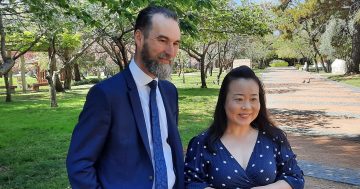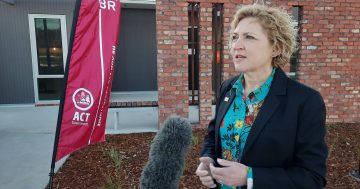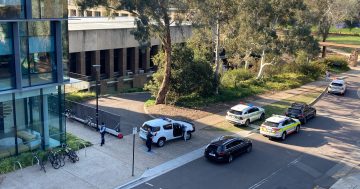
Mental Health Minister Shane Rattenbury has announced a new $4.5 million package for mental health services in the ACT. Photo: Region Media.
A $4.5 million mental health stimulus package announced today (Wednesday, 6 May) will prop up inundated services during the COVID-19 crisis after an anxiety-ridden summer of bushfires and smoke.
Among the key initiatives, the package’s capstone is an expanded $1.4 million emergency response program for mental health, extending the police, ambulance, clinician emergency response (PACER) to seven days and propping up the territory’s Home Assessment Acute Response Team (HAART).
HAART provides home-based mental health crisis assessment, short term treatment and support, and referral pathways for ongoing hospital and community care.
Half a million dollars has also been set aside for additional accommodation for people exiting acute inpatient units.
Mental Health Minister Shane Rattenbury said that the funding help tides over inundated mental health services and community organisations for the remainder of the year, until the delayed ACT budget can be drawn up.
“This will provide that short term injection that is needed to increase capacity,” Mr Rattenbury told Region Media.
“The history suggests, and all the research points to the fact that the stressors we are seeing through COVID-19 – particularly the financial stress – will potentially increase the rate of suicide, we are very cognisant of that.
“Of course we have the anecdotal feedback, the people in the sector do pick up the trends even though the data comes much later which is certainly why we are investing now …to try and in that sense be pre-emptive and bolster the support services.”
One of these initiatives includes pre-emptive measures to keep people away from the emergency department by intervening before a crisis situation develops. Two Safe Haven Cafes – one on the Canberra Hospital campus and another in the city – will be established to support a safe alternative for people suffering from mental health issues and allow them to connect with others in a bid to counter the loneliness and isolation that lockdowns exude.
“It can be a way of building social connection, it can be having somebody to talk to, it can help people deescalate if they are in the middle of a crisis by having a quite safe place to seek support,” Mr Rattenbury said.
“It is recognition that often people just need a conversation to feel better and it can help them get through those difficult moments.”
The model is similar to the Melbourne model at St Vincent’s Hospital, which Mr Rattenbury visited earlier this year. It will not operate 24/7.
Additionally, $100,000 is being used to fund grief counselling services in the territory for people affected by COVID-19. Lockdown measurements and physical restrictions have meant that many people have not been able to farewell their loved ones in the usual ways during this period. Funerals have been live-streamed and wakes postponed, leaving families and individuals without support.
“While we have not had many COVID-19 related deaths, there are other deaths occurring in this period as there normally would be, but people have not been able to have funerals and wakes in the way they normally would,” Mr Rattenbury said.
But a lifeline may be extended to those suffering from isolation and loneliness by the end of the week. National Cabinet is meeting on Friday after deliberating over further easing physical distancing restrictions, and larger group gatherings are expected to be announced.
Mr Rattenbury says he expects the mental health sector and community organisations to take full advantage of any announcements after organisations like Menslink were forced to adapt their services to the distancing requirements and operated one-one-one mentor exercising initiatives.
“I would anticipate that mental health groups would take advantage of those and look at ways of putting group activities back together in a way that is safe and appropriate for the circumstances,” he said.
The funding builds on the $9 million for community support and non-for-profit organisations that the ACT Government announced in its first two stimulus packages.
If you or anyone you know needs help, you can also contact Lifeline on 13 11 14 for 24-hour crisis support. In an emergency, call triple zero (000).
There are dedicated mental health and wellbeing resources on the ACT Health COVID-19 website.





















